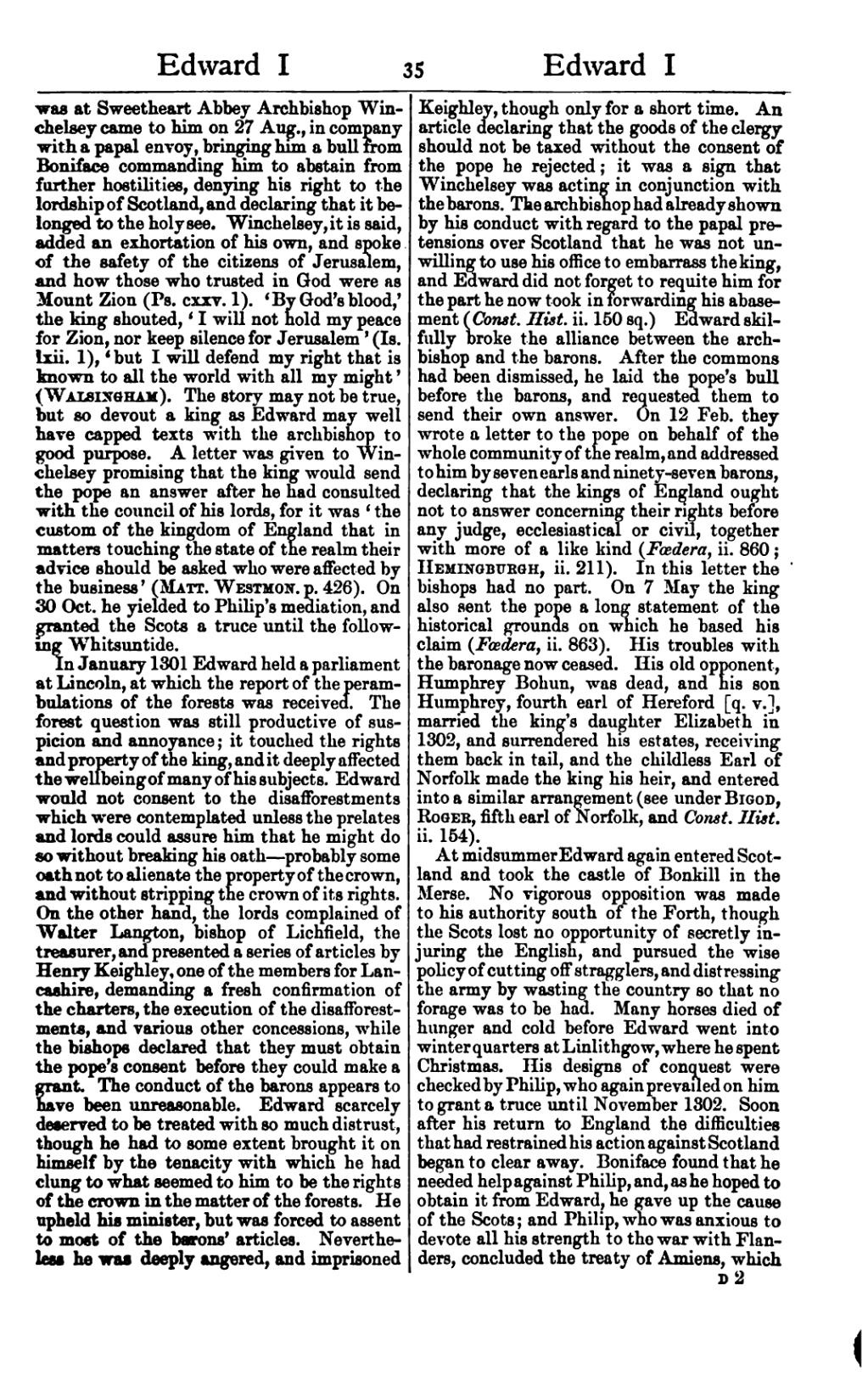was at Sweetheart Abbey Archbishop Winchelsey came to him on 27 Aug., in company with a papal envoy, bringing him a bull from Boniface commanding him to abstain from farther hostilities, denying his right to the lordship of Scotland, and declaring that it belonged to the holy see. Winchelsey,it is said, added an exhortation of his own, and spoke of the safety of the citizens of Jerusalem, and how those who trusted in God were as Mount Ziou (Ps. cxxv. 1). 'By God's blood,' the king shouted, 'I will not hold my peace for Zion, nor keep silence for Jerusalem' (Is. lxii. 1), 'but I will defend my right that is known to all the world with all my might' (Walsingham). The story may not be true, but so devout a king as Edward may well have capped texts with the archbishop to good purpose. A letter was given to Winchelsey promising that the king would send the pope an answer after he had consulted with the council of his lords, for it was 'the custom of the kingdom of England that in matters touching the state of the realm their advice should be asked who were affected by the business' (Matt. Westmon. p. 426). On 30 Oct. he yielded to Philip's mediation, and granted the Scots a truce until the following Whitsuntide.
In January 1301 Edward held a parliament at Lincoln, at which the report of the perambulations of the forests was received. The forest question was still productive of suspicion and annoyance; it touched the rights and property of the king, and it deeply affected the wellbeing of many of his subjects. Edward would not consent to the disafforestments which were contemplated unless the prelates and lords could assure him that he might do so without breaking his oath —probably some oath not to alienate the property of the crown, and without stripping the crown of its rights. On the other hand, the lords complained of Walter Langton, bishop of Lichfield, the treasurer, and presented a series of articles by Henry Keighley, one of the members for Lancashire, demanding a fresh confirmation of the charters, the execution of the disafforestments, and various other concessions, while the bishops declared that they must obtain the pope's consent before they could make a grant. The conduct of the barons appears to have been unreasonable. Edward scarcely deserved to be treated with so much distrust, though he had to some extent brought it on himself by the tenacity with which he had clung to what seemed to him to be the rights of the crown in the matter of the forests. He upheld his minister, but was forced to assent to most of the barons' articles. Nevertheless he was deeply angered, and imprisoned Keighley, though only for a short time. An article declaring that the goods of the clergy should not be taxed without the consent of the pope he rejected; it was a sign that Winchelsey was acting in conjunction with the barons. The archbishop had already shown by his conduct with regard to the papal pretensions over Scotland that he was not unwilling to use his office to embarrass the king, and Edward did not forget to requite him for the part he now took in forwarding his abasement (Const Hist ii. 150 sq.) Edward skilfully Droke the alliance between the archbishop and the barons. After the commons had been dismissed, he laid the pope's bull before the barons, and requested them to send their own answer. On 12 Feb. they wrote a letter to the pope on behalf of the whole community of the realm, and addressed to him by seven earls and ninety-seven barons, declaring that the kings of England ought not to answer concerning their rights before any judge, ecclesiastical or civil, together with more of a like kind (Fœdera, ii. 860; Hemingburgh, ii. 211). In this letter the bishops had no part. On 7 May the king also sent the pope a long statement of the historical grounds on which he based his claim (Fœdera, ii. 863). His troubles with the baronage now ceased. His old opponent, Humphrey Bohun, was dead, and his son Humphrey, fourth earl of Hereford [q. v.], married the king's daughter Elizabeth in 1302, and surrendered his estates, receiving them back in tail, and the childless Earl of Norfolk made the king his heir, and entered into a similar arrangement (see under Bigod, Roger, fifth earl of Norfolk, and Const. Hist. ii. 154).
At midsummer Edward again entered Scotland and took the castle of Bonkill in the Merse. No vigorous opposition was made to his authority south of the Forth, though the Scots lost no opportunity of secretly injuring the English, and pursued the wise policy of cutting off stragglers, and distressing the army by wasting the country so that no forage was to be had. Many horses died of hunger and cold before Edward went into winter quarters at Linlithgow, where he spent Christmas. His designs of conquest were checked by Philip, who again prevailed on him to grant a truce until November 1302. Soon after his return to England the difficulties that had restrained his action against Scotland began to clear away. Boniface found that he needed help against Philip, and, as he hoped to obtain it from Edward, he gave up the cause of the Scots; and Philip, who was anxious to devote all his strength to the war with Flanders, concluded the treaty of Amiens, which
